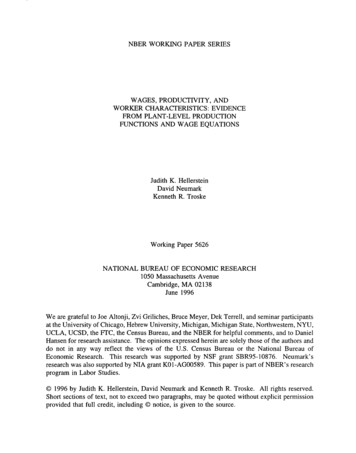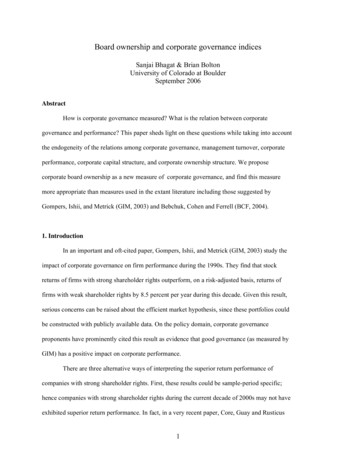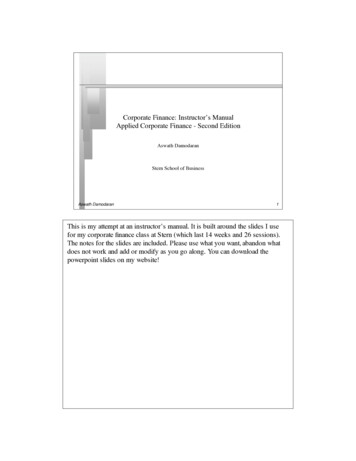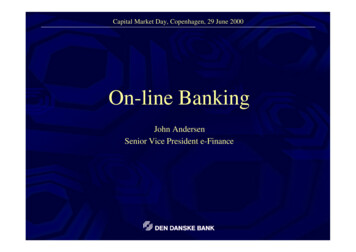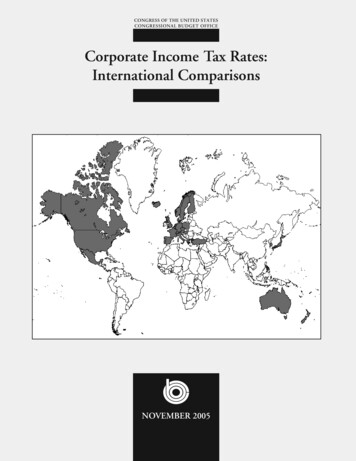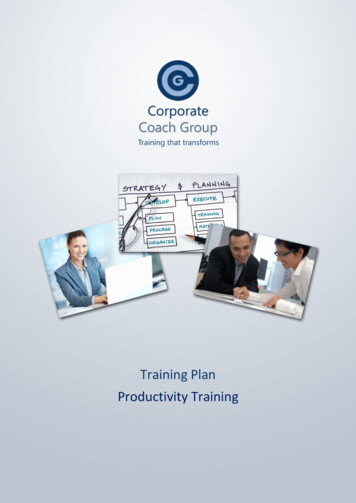
Transcription
Training PlanProductivity Training
Training PlanProductivity TrainingA Training Plan for Your OrganisationWhat is the purpose of the training?The purpose of the training is to initiate a process of rapid improvement, by means ofachieving a shared understanding of the correct knowledge and skills that we need to employ,if we are to achieve our stated goals.Productivity Course SummaryCorporate Coach Group's one-day productivity training course will give you all the skills,knowledge and information you need to maximise team productivity.Nobody is paid for their busyness; you are paid for productivity. Just because people are busy,doesn’t mean they are necessarily being productive. By increasing your team’s efficiency, youwill increase productivity.This one-day training course will give you all the skills, knowledge and information you needto maximise team productivity.Learning Outcomes for the Productivity Course Enhance your productivity and improve your performanceMake the distinction between being busy and being productiveUse the Productivity P-List - Purpose, plan, prep, personal initiativeProductivity SOS: Self, Others, SystemsBoost productivity by improving goal focusLearn to correctly prioritise your workImprove Positive Mental AttitudeCustomer Review“The course content was useful, informative and made you think and look atthings differently. The trainer’s presentation was really engaging, interesting,involved everyone, made me feel at ease.Helen BakerCenterplate at Warner BrosPage 2
Training PlanProductivity TrainingProductivity Training Course OverviewDo you feel that you are busy, working hard, but are not as productive as you think you couldbe?Productivity training will show you how you could get more done, in less time.Productivity training is based upon the application of many related skills: including goalsetting, planning ahead, prevention of error, prioritisation, delegation, and good decisionmaking.This informative training course will show you precisely how to correctly manage your time inthe real world. You will learn how to improve your productivity, by replacing any bad habitswith new, improved skills, and how to handle people and situations that waste your time.Customer Review“The content was very thorough and was just enough for a day course. It coveredmany areas but still remained focused on key areas of professionaldevelopment. Marco was an absolute star, so helpful and kept me on track andfocussed. I cannot fault the delivery of the presentation at all. Had never seenthe tech before, so was really impressed, allowed me to be more engaged. Ididn’t even look at my mobile phone all day!Lily SawyerCreatemaster LtdPage 3
Training PlanProductivity TrainingProductivity Training Course DetailsMorning SessionDefinition: What is productivity training?Productivity training is about making more progress, in less time.To achieve your goals, you need to be at your most productive.Your “productivity” is, in effect, a measure of your efficiency.Ask and answer this fundamental question“What is the most productive use of your time, money and effort?” “Productivity” is a measure of your achievement: a measure of the value of your work“Busyness” is a measure of your activity: a measure of the amount of your workMany people have busy, but non-productive days, where they are working hard, but they arenot making much progress.The purpose of this course is to present key ideas that will allow you to improve yourproductivity. To get more done, whilst simultaneously saving time, money and resources.The Primary Principles of ProductivityThe primary principles of productivity are “value added” and “deadline pressure”, as shown inthe diagram below.Page 4
Training PlanProductivity TrainingThere are four types of activity: Q1 Crisis zone High value, deadline drivenQ2 Productive zone High value not yet deadline drivenQ3 Busy zone Lower value, deadline drivenQ4 Fruitless zone Lower value, not deadline drivenDistinguish between being “Busy” and being “Productive”Busy is a measure of your activity and is a cost.Productive is a measure of your achievement and is a benefit.It is important that you do not fall into the trap of being “busy, but non-productive”, as manypeople do!Page 5
Training PlanProductivity TrainingThe Productivity P listProductivity relies on understanding and working according to the P-list. All the key conceptsrelating to productivity begin with the letter P: Purposefulness: The main reason for your organisation’s existencePlanning: How you intend to achieve your purposeProductive effort: The energy you put into the implementation of your planPersistence: The act of coming back stronger, with a better plan, again and againPrioritisation: The act of organising things into the optimum orderProtocols: The documents that standardise responsesPreparation: The act of making ready, before the implementation of the planProgressive thinking: The act of always looking towards a better futurePrevention of avoidable error: The elimination of self-sabotageProper decision-making methods: The act of picking the best option from manyProblem cause solution analysis: The act of tracing causes and coming up withpractical solutionsProblem implication countermeasure analysis: The act of predicting and stoppingpainful consequencesPersonal initiative: The art of taking action before anyone forces you. Action on yourown volitionPositive mental attitude: The act of taking charge of your own mind and conversationPolitical awareness: The art of gaining the willing cooperation of othersPhilosophy of continuous improvement: The act of never being completely satisfiedwith your current position. It presupposes a desire for more. You are happy, but neversatisfiedProductivity SOSThe three causes of busy but non-productive days are:1. S Self. Your own bad habits, errors and omissions2. O Others. The bad habits, errors and omissions of other people3. S Systems. Inefficient systems that are operating inside and outside yourorganisationPage 6
Training PlanProductivity TrainingWhat are your particular instances of the above SOS list?1. How do you make yourself less productive? What can you do about it?2. How do other people make you less productive? What can you do about it?3. Which two systems are slowing your productivity? What can you do about it?Gain productivity by focusing relentlessly on your Major Definite PurposeProductivity means making progress towards your Major Definite Purpose (MDR). Relentlesslyfocusing on your MDR will improve your productivity. It is vital that everyone in theorganisation is aware of the exact nature of the MDR, by clearly communicating it to everyonewho needs to know.PurposefulnessClarity of purpose and smart target analysisHow to set and communicate the exact target.Prioritise your work so you are always doing the most productive thingPrioritisation is the act of putting things in the right order.The right order is defined by two things: The value of the task andThe best logical sequence.Exercises in prioritisation, putting tasks into the most productive order.Handle interruptions and distractionsMany people are continually distracted and are bounced around by chance circumstances.More productive people operate according to their plan, and can skilfully handle disruptions.How to improve your email managementWe will analyse how you can improve your productivity, by prioritising and organising youremails.Delegate or outsource non-essential processesDelegate non-essential tasks to others, allowing you to focus more time onto more productivematters.Page 7
Training PlanProductivity TrainingLaws of proper delegation: We will look at how to properly delegate the right tasks, to theright people.Solve problems more quickly and effectivelyTo be more productive, it is important to solve problems quickly.Problem cause solution mind mapping.To be more productive, it is important to make the correct decisionsYour life depends upon your ability to make the right decisions in every situation. Therefore,decision-making is one of the most important skills to develop.1.2.3.4.5.Yes, no? decisionsRight or wrong? decisionsWhich one, what kind?Priority order decisionsProblem cause solution, decisionsWe will show you how to make quick, accurate decisions.Page 8
Training PlanProductivity TrainingAfternoon SessionProductivity relies on a certain state of mindProductivity is the product of the inventive mind.If your mindset is productive, then your corresponding actions will be productive.We will analyse and explain how your mindset affects your productivity.Improve your productivity by developing the right mindsetMaintaining a positive mental attitude.Conversation control: Keeping office conversations only on productive topics.There are five types of conversational categories:1. Future will be good: These are goal-orientated, optimistic conversations. Usuallyproductive.2. Future will be bad: These are fear-inducing conversations. Not very productive.3. Past was bad: These are anger conversations. Not very productive.4. The past was good: These can be nostalgic conversations. Non-productive.5. The present moment: These are usually productive conversations.Use the continuous improvement cycleContinuous improvement is based on five major concepts: Purpose: State your Major Definite PurposePlan: Formulate your best planAction: Take consistent actionFeedback: Gather and evaluate the feedback, both positive and negativeChange: Make progress by continually adapting and evolvingRecognise that the continuous improvement formula is a continuous processThe continuous improvement cycle suggests six questions:Page 9
Training PlanProductivity Training1.2.3.4.5.6.What is our Major Definite Purpose or goal?What is our detailed plan?What are our priority actions?What are the positive feedback results from our most recent actions?What are the negative feedback results from our most recent actions?Based on the recent feedback results, what progressive changes do we need to maketo our current plan of action?These six questions should be running as a continuous cycle and will almost guarantee youimproved productivity.How to use negative feedback to improve productivityNegative feedback is a signal to change, improve your plan of action.The continuous improvement cycle is continuous and never-ending and requires thewillingness to make changes.How will you implement the great ideas you have learned on this course?This course is packed with new information and methods which will improve yourproductivity, but only if you put them into practice!We will discuss how you will implement the great ideas you have learned on this course.Final summary and action planningYou will be asked to choose the four most important points you have learned on this course,and commit to a definite plan to improve your personal productivity.Customer Review“The course content was excellent; very useful and easily applied to workenvironment. Highly recommended. Not too ‘airy fairy’ and very pragmatic. Thetrainer’s presentation was clear, enthusiastic and maintained attention for wholetwo days. Packed in a lot of information without it feeling like overload! Very,very good presentation style.Diane ThompsonNSG EnvironmentalPage 10
Training PlanProductivity TrainingTraining Costs / InvestmentBespoke In-House or Live-Online Course 2,000 VAT per training dayPlus, hotel accommodation for trainer if needed (Premier Inn type: not the Hilton!)(International Price Varies)In-House training has been designed to provide a similar experience to our open courses,however we can tailor the content to fit your specific needs.We are able to train in your timezone.All our training includes: A full day of quality training, delivered by an experienced trainerTotal of 6 CPD training hours (usually 9am - 4.30pm), plus an additional 2-3 via postcourse online independent learningFull digital interactive course notesTraining certificateAccess to additional free training material after the course via our post-course portal3 months free telephone coaching: Whilst you are implementing what you havelearned, if you need to, you can contact us for support and guidanceWe suggest the following plan of action:Please send to us:1. Any amendments or changes you wish to make to the programme.2. Your thoughts.3. The next step you would like us to take.Thank you.Corporate Coach Training LtdWalcot HouseParton RoadChurchdownGloucestershireGL3 2JJEmail: lindsey@corporatecoachgroup.comTel: 44 (0) 1452 856091Page 11
Training PlanProductivity TrainingCustomer Reviews“Excellent content with summaries of all-important points. SMART targets and 8Success formula questions were most beneficial. The presentation had a goodbalance between light-heartedness and importance. Take home messages werewell reinforced.Rob HollifieldImmucor“The course covered a lot of topics which were well explained, with goodexamples that kept all of the delegates engaged in the course right to the end.Lots of ideas that need to be applied to my day job. The trainer was able tocontrol the delegates well. Many large and different personalities in the room sonot an easy job. The use of the flip chart, projector and laptop was good.Overall a great day.Sue DurnallAcora“This course was great. It was clear and the digital interactive notes were in agood format for us to fill in. Live online video presentation was clear. First timehaving a person fully in front of the screen like a class session. It gave me asense that I was with the presenter. Also, the white board display was a greatway for us to take notes, follow along and get a clearer understanding from thepresenter. The presenter was easy to follow along, his examples were helpfuland he was very clear in the content. He performed well to get participants tointeract.Valerie LiebermanMondelez“The course content was excellent, very relevant and useful. The trainer deliveredthe course in a really engaging and interesting manner. It is one of the bestcourses I have ever been on.Tony HookingsHouse of FlagsPage 12
Productivity Course Summary Corporate Coach Group's one-day productivity training course will give you all the skills, knowledge and information you need to maximise team productivity. Nobody is paid for their busyness; you are paid for productivity. Just because people are busy, doesn't mean they are necessarily being productive.
